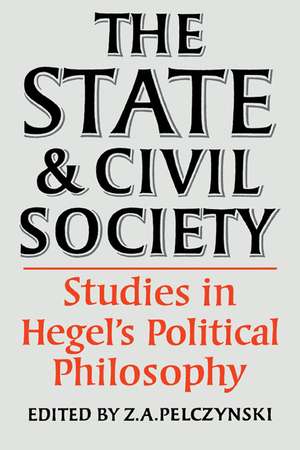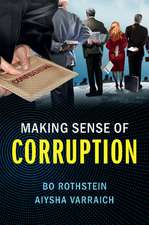The State and Civil Society:Studies in Hegel's Political Philosophy
Autor Z. A. Pelczynskien Limba Engleză Paperback – 31 oct 1984
Preț: 289.78 lei
Nou
Puncte Express: 435
Preț estimativ în valută:
55.45€ • 57.21$ • 46.27£
55.45€ • 57.21$ • 46.27£
Carte tipărită la comandă
Livrare economică 26 martie-09 aprilie
Preluare comenzi: 021 569.72.76
Specificații
ISBN-13: 9780521289696
ISBN-10: 0521289696
Pagini: 340
Dimensiuni: 152 x 228 x 21 mm
Greutate: 0.5 kg
Editura: Cambridge University Press
Colecția Cambridge University Press
Locul publicării:New York, United States
ISBN-10: 0521289696
Pagini: 340
Dimensiuni: 152 x 228 x 21 mm
Greutate: 0.5 kg
Editura: Cambridge University Press
Colecția Cambridge University Press
Locul publicării:New York, United States
Cuprins
Preface; Introduction: the significance of Hegel's separation of the state and civil society Z. A. Pelczynski; 1. From self-consciousness to community: act and recognition in the master-slave relationship J. M. Bernstein; 3. Hegel, Plato and Greek 'sittlichkeit' M. J. Inwood; 4. Political community and individual freedom in Hegel's philosophy of state Z. A. Pelczynski; 5. Hegel's radical idealism: family and state as ethical communities Merold Westphal; 6. Hegel's concept of the state and Marx's early critique K.-H. Ilting; 7. Towards a new systematic reading of Hegel's Philosophy of right Klaus Harmann; 8. Propaganda and analysis: the background to Hegel's article on the English Reform Bill M. J. Petry; 9. Obligation, contract and exchange: on the significance of Hegel's abstract right Seyla Benhabib; 10. Hegel on work, ownership and citizenship Alan Ryan; 11. Subjectivity and civil society Garbis Kortian; 12. The dialectic of civil society K.-H. Ilting; 13. Hegel on identity and legitimation Raymond Plant; 14. Economy, utility and community in Hegel's theory of civil society A. S. Walton; 15. Nation, civil society, state: Hegelian sources of the Marxian non-theory of nationality Z. A. Pelczynski; Notes; Bibliography.
Descriere
This book discusses the state and civil society which were distinguished by Hegel as two stages in the dialectical development from the family to the nation.











